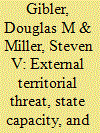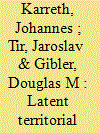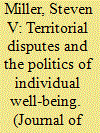|
|
|
Sort Order |
|
|
|
Items / Page
|
|
|
|
|
|
|
| Srl | Item |
| 1 |
ID:
134155


|
|
|
|
|
| Publication |
2014.
|
| Summary/Abstract |
We argue that the regional threat environment a state faces plays a consequential role in its political development and the likelihood of experiencing future intrastate wars. Challenges to a state's territorial integrity lead governments to increase their military personnel, and the resources that support these increases most often come willingly from a public that seeks security. Territorial threats are unlike other types of threats because they challenge individual lives and livelihoods, which both connects the average citizen with the state and allows for easier government extraction of necessary resources. Thus, external territorial threats increase state capacity by unifying the state and by increasing the repressive power of the central government. We identify territorial threats as both latent and realized claims against state territories and find that the presence of an external threat to territory leads to an increase in the capacity of central governments to connect and extract from its citizens, as well as the capacity to repress potential regime dissidents. We also find that the presence of a claim against a state's territory from a neighbor corresponds with a substantial decrease in the likelihood of intrastate conflict at both high and low levels of intensity. The effect of territorial threat is observed even in the short term after a territorial threat has been resolved. Our tests, using standard models of state capacity and insurgency models of conflict on a sample of all states from 1946 to 2007, are robust to multiple model specifications.
|
|
|
|
|
|
|
|
|
|
|
|
|
|
|
|
| 2 |
ID:
184200


|
|
|
|
|
| Summary/Abstract |
Why do some democracies revert to non-democratic forms of governance? We develop an explanation of democratic reversals that emphasizes the influence of states’ external border relations on domestic politics. Latent threats to a state’s territory encourage political centralization of authority in the executive to defend against danger to the homeland. Latent territorial threat also facilitates the construction and maintenance of large land armies to fight threatening neighbors. Combined, latent territorial threat increases leaders’ domestic power, weakens democratic institutions, encourages other conditions threatening democratic survival, and, ultimately, leads to democratic reversals. Synthesizing prior research on territorial conflict, we generate a quantitative, continuous measure of latent territorial threat against all democracies with contiguous neighbors from 1946 to 2016, using Bayesian estimation. Empirical tests accounting for measurement uncertainty and other common determinants of reversals as well as brief reviews of individual cases of reversal provide robust evidence that democracy failed at higher rates in countries facing high levels of threats to their territory from neighbors. Our study implies that a complete account of the development of democratic institutions should emphasize that domestic factors alone fall short of explaining why democracies fail.
|
|
|
|
|
|
|
|
|
|
|
|
|
|
|
|
| 3 |
ID:
124979


|
|
|
|
|
| Publication |
2013.
|
| Summary/Abstract |
Multiple studies argue that the division of territory between states is a root cause of war in the international system. This is often understood as a function of the unique importance of territory at the level of the individual citizen, because the territory itself directly affects an individual's well-being on multiple dimensions. As such, disputes over territory should also have consequences for an individual's overall subjective appraisal of their well-being. This article argues that disputes over the allocation of territory between states do affect an individual's subjective well-being, but not uniformly. Citizens in states routinely targeted by a territorial threat from a revisionist neighbor are generally unhappy. However, citizens in states that initiate territorial disputes are happier as a result of the aggressive foreign policy of the state leader to secure the coveted territorial good. This is first demonstrated using mixed effects modeling on data drawn from the World Values Survey and Correlates of War Militarized Interstate Dispute dataset. In addition, this article provides an illustration of variations in territorial threat and subjective well-being using the case of Nigeria, finding that Nigerians were happier when their state was initiating territorial threat against its neighbors and less happy during a period when Nigeria itself was the target of territorial threat. The analyses provided advance the territorial conflict research program by measuring the individual-level effects of territorial disputes. In addition, the findings add to a growing scholarship on the political determinants of an individual quality of life, sometimes considered the 'ultimate dependent variable' in social science.
|
|
|
|
|
|
|
|
|
|
|
|
|
|
|
|
|
|
|
|
|